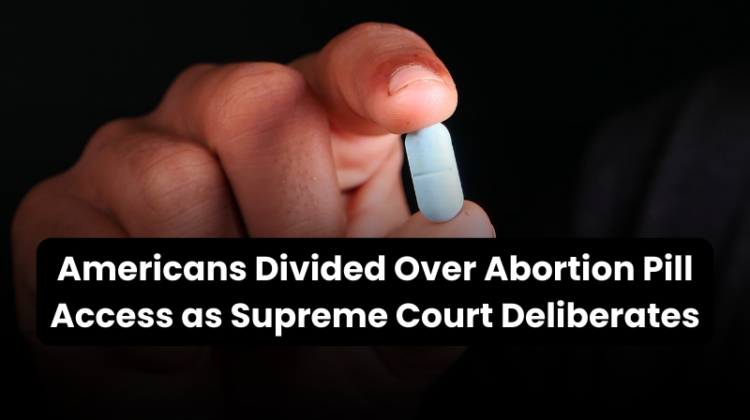
As the U.S. Supreme Court deliberates on crucial abortion cases, a recent Reuters/Ipsos poll has revealed a stark divide among Americans regarding the accessibility of abortion pills.
The survey, conducted from May 7-14, found that 50% of respondents supported the requirement for women to see a doctor in person before receiving abortion medication, while 33% opposed the rule, and 17% remained unsure.
The poll results highlight the polarization of the abortion debate, with 67% of Republicans and 37% of Democrats favoring the in-person dispensing requirement for mifepristone, a drug used in medication abortions.
________________________________________________________________________
- Americans are divided on abortion pill access: 50% support the in-person doctor visit requirement, and 33% oppose it.
- The bipartisan majority (77%) backs abortion access in medical emergencies despite state bans.
- Support for abortion rights grows: 57% say it should be legal in most cases, up from 46% in 2014
________________________________________________________________________
Americans Divided Over Abortion Pill Access as Supreme Court Deliberates
The Supreme Court, which currently has a 6-3 conservative majority, is expected to rule on the accessibility of mifepristone by late June.
The case challenges the Food and Drug Administration’s decision to allow medication abortions up to 10 weeks of pregnancy and permit mail delivery of the drug without a prior in-person visit to a clinician.
Despite the division on abortion pill regulations, the poll found broad bipartisan support for requiring states with strict abortion bans to allow the procedure in emergency cases to protect the health of pregnant patients.
An overwhelming 77% of respondents, including 86% of Democrats and 77% of Republicans, supported this requirement, which is at the heart of Idaho’s challenge to the federal Emergency Medical Treatment and Labor Act (EMTALA).
Moreover, majorities from both parties opposed the idea of state governments tracking pregnancies to take action against terminations that violate state laws.
This stance comes in the wake of recent comments by Republican presidential candidate Donald Trump, who told Time magazine that he would not prevent states from monitoring pregnancies.
Since the Supreme Court’s 2022 decision to overturn Roe v. Wade, which had established a national right to abortion, 16 states have banned the procedure in all or most cases.
Consequently, medication abortion has become the most common method of ending pregnancies, accounting for more than 60% of U.S. abortions.
The Reuters/Ipsos poll also revealed a shift in public opinion over the past decade, with 57% of respondents now supporting abortion rights in all or most cases, up from 46% in 2014 polls.
Conversely, 31% of respondents in the latest poll believed abortion should be illegal in most or all cases, down from 43% in 2014.
As the Supreme Court prepares to rule on these high-profile abortion cases, the nation remains divided on the issue of abortion pill access.
The poll results highlight the importance of striking a balance between protecting women’s reproductive rights and addressing the concerns of those who oppose abortion.
The court’s decisions in these cases will undoubtedly have far-reaching implications for the future of abortion access in the United States.
Subscribe to our newsletter now and get the inside edge to the financial world!

Leave a Reply